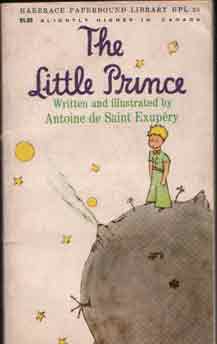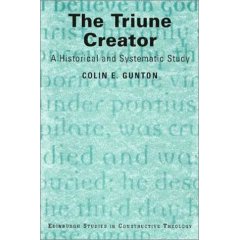Sunday, December 24, 2006
Friday, December 22, 2006
Bonhoeffer and Rudd
 A few days ago an article appeared in the Sydney Morning Herald about the rise of religion in Australian politics and the "new sectarianism." Well, there is an interesting article in today's
A few days ago an article appeared in the Sydney Morning Herald about the rise of religion in Australian politics and the "new sectarianism." Well, there is an interesting article in today'sSMH about Kevin Rudd (the new Leader of the Federal Opposition) and his emulation for Dietrich Bonhoeffer, and the dying breed of "politicians with conscience." (There's also a follow-up article on the same page by the same writer on why Al Gore is the "ants pants").
You'll find the article here. You will also find Rudd's original article about Faith and Politics from October's Monthly magazine here.
Monday, December 11, 2006
Genesis 3 and the Ashes
- Michael Wells
Monday, November 27, 2006
Sea III

Dark Days:
From the beginning humans arrogantly asserted their independence from God. Though it broke God’s heart, he let them go. By rejecting the source of life and peace, they opened the door for evil to infect God’s world. Life gave way to death, and conflict came to dominate God’s world. Every human since, including you and me, has been caught up in this. We have all sought to live independently of God. We have all experienced enslavement to Evil. And consequently, we all know the anguish of dealing with death and conflict in our lives. As for the Sea, it too could be said to be now in conflict with humanity. Originally humanity was to exercise dominion over the Sea, but now from the Sea came judgment on humanity. What God had declared was’ very good’ he now regretted making. So “the fountains of the great deep burst forth, and the windows of the heavens were opened. And rain fell upon the earth forty days and forty nights.” And the waters rose. Through the Sea, an end was almost made of humanity and all of God’s creation. Yet for the sake of his creation, God acted through Noah and his family to redeem creation. However, the Sea would continue to be a place of dread for the people of God.
Sunday, November 26, 2006
Sea II

Have previously pondered the place of the sea in the bible, I decided that I might quickly run through the sea using the God's World formula: First Days, Dark Days, Israel, Jesus, Last Day, Today. So here is the First Day post.
"This is God’s world. He made it and continues to sustain it. He made it to reflect his nature by being a place of life and peace. He made humanity to enjoy his world and to live in thankful obedience and dependence on him. When God created the heavens and the earth, it was tohu mobohu – formless and void – covered in the ‘waters of the deep’ and the Spirit of God hovered over the waters. God separated these waters and formed out of them the sky, the seas, and the land. God saw what he had made, and it was good, including the Sea, which was teeming with life (Gen. 1:21). And humans, created to live in obedience to and dependence on God, were to exercise dominion over the living creatures of the sea.
10 points if you can name the beach.
Friday, November 24, 2006
Wednesday, November 22, 2006
Photos of the Mountains Bush Fire from my House

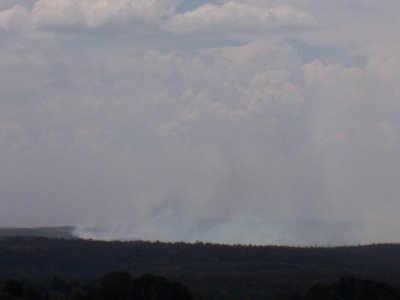

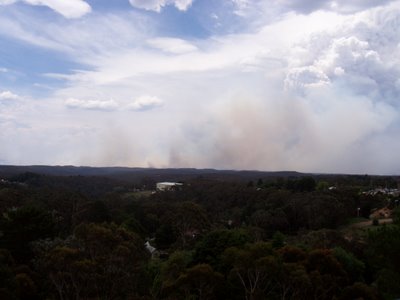

 These are the strangest fires ever - no one has no idead what they are doing because they aren't doing what fires normally do. At least the string winds powering the flames are driving the smoke out of the upper mountains into Springwood and the city. Oh yes, the main smoke plume is a concern as it is 40,000 ft high and causing its own weather patterns.
These are the strangest fires ever - no one has no idead what they are doing because they aren't doing what fires normally do. At least the string winds powering the flames are driving the smoke out of the upper mountains into Springwood and the city. Oh yes, the main smoke plume is a concern as it is 40,000 ft high and causing its own weather patterns.These pictures are my own and taken from out the front of my house and on top of a certain tall public building in Katoomba. You can find it more here.
Monday, November 20, 2006
"Is Gambling a Problem for You?"
 A question of church ethics: should churches run raffles/guessing competitions (a guessing competition is more or less a raffle minus the government license)? After all, the church will rightly condemn the power that gambling (lotteries, pokies, et al) holds on people, but turn into a church run guessing competition, and make the main prize a Bridge Climb rather than a QANTAS holiday, does that make it all hokey dokey?
A question of church ethics: should churches run raffles/guessing competitions (a guessing competition is more or less a raffle minus the government license)? After all, the church will rightly condemn the power that gambling (lotteries, pokies, et al) holds on people, but turn into a church run guessing competition, and make the main prize a Bridge Climb rather than a QANTAS holiday, does that make it all hokey dokey?Of course, I could be over reacting. But if it is true to say that the churches life is its mission and the churches mission is its life, than our call to be distinct from he rest of society must be taken seriously in all areas of the church - even the church fete.
"...let your light shine before others, so that they may see your good works and give glory to your Father who is in heaven."
Is Gambling a problem for you? Call G-line (NSW counseling service) 1800 633 635.
Wednesday, November 15, 2006
Jesus and the Eyewitnesses
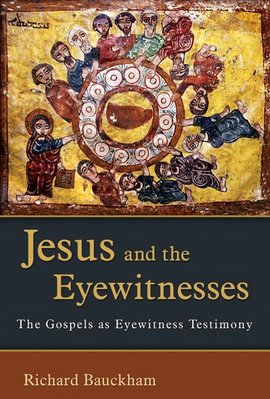 An exciting new Richard Bauckham book is about to hit the shelves: Jesus and the Eyewitnesses - The Gospels as Eyewitness Testimony. It could have a big impact on New Testament academia and shcolarship, and has already received these reviews:
An exciting new Richard Bauckham book is about to hit the shelves: Jesus and the Eyewitnesses - The Gospels as Eyewitness Testimony. It could have a big impact on New Testament academia and shcolarship, and has already received these reviews:N. T. Wright
— Bishop of Durham
“The question of whether the Gospels are based on eyewitness accounts has long been controversial. Now Richard Bauckham, in a characteristic tour de force, draws on his unparalleled knowledge of the world of the first Christians to argue not only that the Gospels do indeed contain eyewitness testimony but that their first readers would certainly have recognized them as such. This book is a remarkable piece of detective work, resulting in a fresh and vivid approach to dozens, perhaps hundreds, of well-known problems and passages.”
Graham Stanton
— University of Cambridge
“Richard Bauckham’s latest book shakes the foundations of a century of scholarly study of the Gospels. There are surprises on every page. A wealth of new insights will provoke lively discussion for a long time to come. Readers at all levels will be grateful for detective work that uncovers clues missed by so many.”
James D. G. Dunn
— University of Durham
“Another blockbuster from the productive pen of Richard Bauckham. Stimulated particularly by Samuel Byrskog’s Story as History — History as Story, Bauckham builds an impressive case for recognition of the controlling influence of eyewitness testimony on the formulation and use of the Jesus tradition, which resulted in the Evangelists’ ‘Jesus of testimony.’ Not to be missed!”
Martin Hengel
— University of Tübingen
“A fascinating book! I have not read such a stimulating monograph about Jesus research in a long time. With its high scholarly standards and astute arguments, Jesus and the Eyewitnesses shows new insights and ways of investigation. It will therefore become a pioneer work refuting old and new errors. This book ought to be read by all theologians and historians working in the field of early Christianity. Further, Bauckham’s convincing historical method and broad learning will also help pastors and students to overcome widespread modern Jesus-fantasies.”
Chris Tilling at Chrisendom has interviewed Bauckham about the book, and you can find the first two posts here and here.
Tuesday, November 14, 2006
The Sea in the Bible
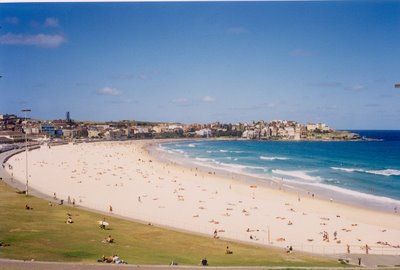 I was able to go to Bondi Beach today with Alison (aka Spally), and whilst worrying about being attacked by sharks and the salt water sting in my throat, I managed to find time to ponder upon the sea in the bible. We're often told that the Israelities did not like and viewed it as a place of evil; the beast in Revelation comes from the sea, and the Leviathan is spoken about as being a sea like creature. However, the people of God also pass through the sea in a proto-type of baptism.
I was able to go to Bondi Beach today with Alison (aka Spally), and whilst worrying about being attacked by sharks and the salt water sting in my throat, I managed to find time to ponder upon the sea in the bible. We're often told that the Israelities did not like and viewed it as a place of evil; the beast in Revelation comes from the sea, and the Leviathan is spoken about as being a sea like creature. However, the people of God also pass through the sea in a proto-type of baptism.So what is the bible's view of the sea. My next post will be on this very question, so if ANYONE has any thoughts, let me know.
Sunday, November 12, 2006
Medieval Resurrection pictures


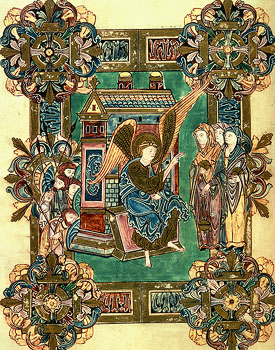

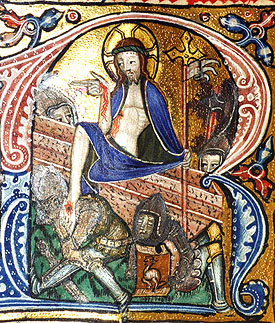
Thursday, November 09, 2006
Christian Hero 1 - Anthony Ashley Cooper
 When William Wilberforce died in 1833, one of those who attended his funeral was Anthony Ashley Cooper, later Lord Shaftesbury. In the words of biographer John Pollock, "Thus the two crusades and the lives of two great social reformers touched briefly and symbolically … an end and a beginning."
When William Wilberforce died in 1833, one of those who attended his funeral was Anthony Ashley Cooper, later Lord Shaftesbury. In the words of biographer John Pollock, "Thus the two crusades and the lives of two great social reformers touched briefly and symbolically … an end and a beginning." A few weeks earlier, William Gladstone, newly elected Member of Parliament and future prime minister, met Wilberforce for the first time. Thus Pollack could have written about three great reformers' lives touching briefly. For if Wilberforce was the greatest Christian politician of his era, Shaftesbury and Gladstone were the greatest of theirs.
Unlike Wilberforce, Shaftesbury was a devout Christian when he became a Member of Parliament in 1826. He felt God had called him "to devote whatever advantages He might have bestowed … in the cause of the weak, the helpless, both man and beast, and those who had none to help them."
He didn't receive this faith from his parents, though. Born the son of the sixth earl of Shaftesbury, he was raised in a home devoid of parental affection. Virtually all he knew of love he experienced through the kindness of a maid named Maria Millis. It was to her that he later traced the beginning of his evangelical Christianity.
Two years into Parliament, Shaftesbury commenced his efforts to alleviate the injustices caused by the Industrial Revolution, which included acts that
- prohibited employment of women and children in coal mines,
- provided care for the insane,
- established a ten-hour day for factory workers,
- outlawed employing young boys as chimney sweeps.
Anthony Ashley Cooper, seventh Earl of Shaftesbury, philanthropist, was the eldest son of the sixth earl, and of Anne, fourth daughter of the third Duke of Marlborough. He was born on 28 April 1801 at 24 Grosvenor Square, London, his father being then a younger brother of the family, but when his father succeeded to the title and estates in 1811 his home was at St. Giles in Dorsetshire, the family seat. He was educated at Harrow, and at Christ Church, Oxford, and obtained a first class in classics in 1822. In 1832 he took his degree of M.A., and in 1841 he was made D.C.L.
He entered parliament as Lord Ashley in 1826 as member for Woodstock, the pocket borough of the Marlborough family, and gave a general support to the governments of Liverpool and Canning. He was returned for Dorchester in 1830 and 1831, and sat for Dorset from 1831 to 1846. His first speech was an earnest pleading in favour of a proposed grant to the family of Mr. Canning, after his sudden death. In 1828, under the Duke of Wellington, he obtained the post of a commissioner of the board of control, and in 1834 Sir Robert Peel made him a lord of the admiralty. If he had chosen a political career, his rank, connections, and high abilities and character might have placed the highest offices of the state within his grasp. But he was early fascinated by another object of pursuit -- the promotion of philanthropic reform; and in the ardour of his enthusiasm for this line of action he deemed it best to maintain a somewhat independent position in relation to politics.
In 1830 he married Lady Emily Cowper, daughter of Earl and Lady Cowper, and by the subsequent marriage of Lady Cowper to Lord Palmerston he became stepson-in-law to the future premier. In 1851, on the death of his father, he succeeded to the earldom. Lady Shaftesbury died in 1872, to the deep grief of her much-attached husband. Their children consisted of six sons and four daughters.
The first social abuse that roused the interest of Ashley was the treatment of lunatics. In 1828, Mr. Gordon, a benevolent member of parliament, obtained a committee to inquire into the subject; Ashley's interest was awakened, and he was himself named a member of the committee. Not content with official inquiries, he did much by personal visitation to ascertain the real condition of lunatics in confinement, and saw such distressing evidence of ill-treatment that next year he brought in a bill to amend the law in one particular. All the rest of his life he continued, as one of the commissioners in lunacy, to interest himself in the subject, and before his death he had secured a complete reform of the Lunacy Acts, and effected an untold improvement in the condition of the unfortunate class who had formerly been treated with so much severity and cruelty. This may be ranked as the first of his services to philanthropy.
His next effort was to reform the law relating to the employment of workers in mills and factories. About the time when he entered parliament the condition of the workers in factories, and especially the children, had begun to attract the earnest attention of some. In parliament Mr. M. T. Sadler and Mr. Oastler took up the matter warmly; Mr. Sadler, in particular, as Shaftesbury afterwards said with much generosity, ‘maintained the cause in parliament with unrivalled eloquence and energy.’ Mr. Sadler having lost his seat at the election in 1833 the charge of the movement was entrusted to Ashley. His proposal that the period of labour should be limited to ten hours a day met at first with the fiercest opposition. A bill which he introduced was so emasculated by the government that he threw it over on them; it was ultimately carried, but was not satisfactory. A deep impression was produced by Ashley in describing visits paid by him to hospitals in Lancashire, where he found many workers who had been crippled and mutilated under the conditions of their work; they presented every variety of distorted form, ‘just like a crooked alphabet.’ Returning afterwards to the subject, he showed the enormous evils and miseries which the existing system was producing; but the government would not move. So late as 1844 his proposal for a limit of ten hours was rejected. It was not till 1847, when Ashley was out of parliament, that the bill was carried. The operation of the act has proved most satisfactory, and many who at first were most vehement opponents afterwards came to acknowledge the magnitude of the improvement. At many times in the subsequent part of Ashley's life he got the factory acts amended and extended. New industries were brought within their scope. He always maintained that he would never rest till the protection of the law should be extended to the whole mass of workers.
During this struggle collieries and mines engaged his attention. Here, too, the evils brought to light, especially with respect to women and children, were appalling. Many women were found to be working in dismal underground situations, in such a way as tended to degrade them to the level of brutes. Children, sometimes not over four or five years of age, were found toiling in the dark, in some cases so long as eighteen hours a day, dragged from bed at four in the morning, and so utterly wearied out that instruction, either on week days or Sundays, was utterly out of the question. Often they were attached by chain and girdle to trucks which they had to drag on all-fours through the workings to the shaft. The opposition were struck dumb by these revelations. An act was passed in 1842 under Ashley's care abolishing the system of apprenticeship, which had led to fearful abuses, and excluding women and boys under thirteen from employment underground.
The treatment of ‘climbing boys,’ as the apprentices of chimney-sweepers were called, was another of the abuses which he set himself to remedy. If the evil here was not so glaring as in the factories and pits, it was only because the occupation was more limited. Ashley obtained an act for the protection of the apprentices, and many years afterwards, when some laxity in the administration was discovered, took steps to have it more rigidly enforced.
The country was greatly agitated at this time on the subject of the corn laws. Hitherto Ashley had acted generally with the conservative party, but believing that a change in the corn laws was necessary, he resigned his seat for Dorset in January 1846, and for a time was out of parliament. In the next parliament he was returned (30 July 1817) for the city of Bath. The leisure which he obtained by retiring from parliament was turned by him to account in visiting the slums of London and acquiring a more full acquaintance with the condition of the working classes. A statement of some of his experiences in this field was given in an article in the Quarterly Review for December 1846. His interest was especially intensified in two movements: the education of the neglected poor, and the improvement of the dwellings of the people.
The movement for ‘ragged schools,’ as they were now called, or ‘industrial feeding schools,’ as Mr. Sheriff Watson of Aberdeen had proposed to call them, had already been inaugurated in Scotland. Ashley became the champion of the cause in parliament. In 1848 he told the House of Commons that ten thousand children had been got into ragged schools, who, there was every reason to hope, would be reclaimed. For thirty-nine years he held the office of chairman of the Ragged School Union, and during that time as many as three hundred thousand children were brought under the influence of the society. The Shoeblack Brigade was the result of another effort for the same class. At one time it numbered 306 members, and its earnings in one year were £12,000. The Refuge and Reformatory Union was a kindred movement; ultimately it came to have 589 homes, accommodating fifty thousand children. Lord Palmerston's bill for the care and reformation of juvenile offenders, which has had so beneficial an influence, was a fruit of Shaftesbury's influence.
Very early in his career he had become profoundly impressed with the important influence of the dwellings of the people on their habits and character. To the miserable condition of their homes he attributed two-thirds of the disorders that prevailed in the community. In 1851 he drew attention to the subject in the House of Lords. The Lodging House Act was passed, which Dickens described as the best piece of legislation that ever proceeded from the English parliament. This, however, represented but a small portion of his labours for the improvement of houses. The views which he so clearly and forcibly proclaimed led many to take practical steps to reform the abuse. The Peabody scheme was at least indirectly the fruit of his representations. On 3 August 1872 he laid the foundation-stone of buildings at Battersea, called the Shaftesbury Park Estate, containing twelve hundred houses, accommodating eight thousand people. On his own estate at Wimborne St. Giles he built a model village, where the cottages were furnished with all the appliances of civilised life, and each had its allotment of a quarter of an acre, the rent being only a shilling a week. As chairman of the central board of public health he effected many reforms, especially during the visitation of cholera in 1849. He was also chairman of a sanitary commission for the Crimea, in regard to which Miss Nightingale wrote that ‘it saved the British army.’
Besides originating and actively promoting to the very end of his life the social reforms now enumerated, Shaftesbury took an active interest in the Bible, Missionary, and other religious societies, and was very closely identified with some of the most important of them. Of the British and Foreign Bible Society, he was president for a great many years. The London City Mission, pursuing its labours among the London poor, deeply interested him. The Church Missionary Society, as well as the missionary societies of the nonconformists, found in him a most ardent friend. He had great pleasure in the Young Men's Christian Association. He was the chief originator of a movement for holding religious services in theatres and music halls -- a movement which he had to defend in the House of Lords from the charge of lowering religion by associating its services with scenes of frivolity.
Of the variety and comprehensiveness of the objects to which his life had been directed an idea may be formed from the enumeration of the city chamberlain when the freedom of the city of London was conferred upon him. The chamberlain referred to his labours in connection with the Climbing Boys Act, the Factory and Ten Hours Acts, Mines and Collieries Regulation Acts, the establishment of ragged schools, training ships, and refuges for boys and girls, his share in the abolition of slavery, the protection of lunatics, the promotion of the City Mission and the Bible Society, and likewise his efforts for the protection of wronged and tortured dumb animals.
In religion Shaftesbury was a very cordial and earnest supporter of evangelical views. Ritualism and rationalism were alike abhorrent to him. While attached to the Church of England his sympathies were with evangelicalism wherever he found it. Sometimes he expressed himself against opponents with an excessive severity of language, inconsistent with his usual moderation. All movements in parliament and elsewhere in harmony with evangelical views, such as Sir Andrew Agnew's for the protection of the Lord's day, the union of religion and education, and opposition to the Church of Rome, found in him a cordial advocate. But his heart was especially moved by whatever concerned the true welfare of the people. Though the reverse of a demagogue, retaining always a certain aristocratic bearing as one who valued his social rank, he was as profoundly interested in the people as the most ardent democrat. Hating socialism and all schemes of revolutionary violence, he most earnestly desired to see the multitude enjoying a larger share of the comforts of life. He had thorough confidence in the power of christianity to effect the needed improvements, provided its principles were accepted and acted on, and its spirit diffused among high and low.
At various times, and especially after he became connected with Lord Palmerston, Shaftesbury was invited to join the cabinet. At one time he was offered the chancellorship of the duchy of Lancaster, but as he made it a condition that he should be at liberty to oppose the Maynooth endowment the post was refused. The first time the ribbon of the Garter was offered to him he declined it, though he accepted it some years later (21 May 1862). Beginning life as a conservative, his interest in the people and very genuine love for civil and religious liberty drew him towards the popular side. His freedom from party ties sometimes enabled him to act as mediator when an understanding between parties was indispensable. In many confidential matters he was the adviser of Lord Palmerston, and especially in the filling up of vacant bishoprics and other important offices in the church of England. His great influence with the people was recognised in times of peril and turned to useful account. He was oftener than once consulted by the queen and the prince consort on trying emergencies. In 1848, when the mob of London was believed to be meditating serious riots, Ashley was requested to use his influence to prevent the outbreak. He summoned to his aid the City Mission, and for weeks together very earnest efforts were made to restrain the multitude, with the result that when the panic was over, Sir George Grey, home secretary, wrote to him and thanked him and the City Mission for their valuable aid. On one occasion he received a memorial from forty notorious London thieves asking him to meet with them. He complied with the request, and addressed a meeting of 450, whom he besought to abandon their evil ways, and with such success that the greater part, availing themselves of an emigration scheme, were rescued from a life of crime.
In appearance Shaftesbury was tall and handsome, with a graceful figure and well-cut regular features. He spoke with neatness, force, and precision, and was highly effective without being much of an orator. From time to time he received valuable testimonials from the class to whose benefit his labours were directed. One of these, which he valued very highly, was a colossal bust presented to Lady Shaftesbury in 1859 by four thousand Lancashire operatives. Another was a donkey given to him by the London costermongers. His eightieth birthday was celebrated by a great public meeting in the Guildhall, presided over by the lord mayor, and represented on the part of the government by the late Mr. W. E. Forster, who not only rehearsed Shaftesbury's achievements, but referred to his own obligations to his example. In 1884 he received the freedom of the city of London. In May 1885 he was presented with an address from old scholars of the ragged schools. In reply he declared that he would rather be president of the ragged schools than of the Royal Academy; but for himself he would only say that the feeling in his heart was, ‘What hast thou that thou hast not received?’
Shaftesbury retained a great part of the vigour both of his mind and body to very near the end of his life. The infirmities of old age showed themselves chiefly in gout and deafness. In the autumn of 1885 he went to Folkestone, but died of congestion of the lungs, 1 October 1885. He was lord-lieutenant of Dorset from 1856 till death.
The lives of Howard, Mrs. Fry, Wilberforce, and other great philanthropists are associated mainly with a single cause -- Shaftesbury's with half a score. They opened out to him one after another in a kind of natural succession, and while at the very outset he had to contend with vehement opposition, during the latter part of his career he was borne along by the applause of the community, found willing coadjutors in all ranks of society, and had no more serious opponent than the vis inertiæ of a slumbering public. He was indeed the impersonation of the philanthropic spirit of the nineteenth century. Mr. Carlyle, in his ‘Latter-Day Pamphlets,’ has written severely enough against ‘this universal syllabub of philanthropic twaddle,’ but his sarcasm does not hit Shaftesbury. What horrified Carlyle was the coddling of criminals and increasing the burdens of honest labourers in the interest of scoundrels. Carlyle wrote in the name of justice. In the same name Shaftesbury worked. To redress wrong was the object of his first undertakings. He carried the same principle with him throughout. His mind did not greatly appreciate political changes which sought to elevate the social position of the workman, nor did he favour these much when others brought them forward. To promote industry, self-control, and useful labour, to make men faithful to the obligations of home and country and religion, were his constant aims. It would not be easy to tell how much the life of Shaftesbury has availed in warding off revolution from England, and in softening the bitter spirit between rich and poor.
Most of this is taken from here.
a. 10 points if you can name the artist in the top picture. b. 10 points if you can name the statue in the second picture AND tell me where I could find it.
Tuesday, November 07, 2006
Cool Hebrew
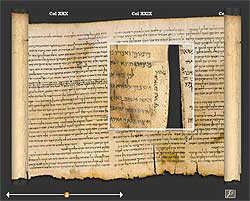
The zoom feature doesn’t magnify the image quite enough for serious research, but it is still a very useful online resource.
Monday, November 06, 2006
"Dual authority"
Yet, as in speaking of the Incarnation itself, we cannot affirm the hypostatic union without the two natures, so with the Kingdom of God we cannot conceive the henosis of political and spiritual without the duality of the two terms held together in it. That is why those who have asserted that a conception of Two Kingdoms is fundamental to Christian political thought have spoken truly, though at great risk of distorting the truth if they simply leave it at that. The unity of the kingdoms, we may say, is the heart of the Gospel, their duality is the pericardium. Proclaiming the unity of God's rule in Christ is the task of Christian witness; understanding the duality is the chief assistance rendered by Christian reflection."
- Oliver O'Donovan, The Desire of the Nations, p. 82.
Saturday, November 04, 2006
The End of Christendom

O'Donovan on the end of Christendom:
"The Gentile mission had two frontiers, social and political. The church demanded the obedience of society, and it demanded the obedience of society’s rulers. 'Nations shall come to your light, and kings to the brightness of your rising' (Isa. 60:3). The parallel in that text is complementary, not synonymous; the horizons of its two members are different. For while the nations gather to the rising of
In this sense at least, then, the goal of Christendom is 'After Christendom'. Since Christendom has, on our account, to do with the submission of rulers, it prepares the way for something beyond itself, the replacement of the rulers by the Christ. But the hope of such a fulfilment can lose its eschatological character, and be turned to support historicist ideologies which find the dawning of the Kingdom within late-modern secularism. Christendom has ended, we say - but in what sense of the word 'end'? Has it fulfilled itself in the transition from the rule of the kings to the rule of the Christ, or has it simple been eclipsed by the vicissitudes of mission, perhaps to return in another form or, if not to return, to provide a standing remainder of the political frontier which mission must always address? For the historicist conception directs the church to a social mission without a political aspect to it. The moment for the conversion of political agency is, in its view, past.

I take it as beyond dispute that Christendom has in fact ended, in the minimal sense of the verb at least. Our contemporaries no longer think that the rulers of the earth owe service to the rule of Christ. To say this much, of course, is not by any means to give an exhaustive description of the way things stand in

The First Amendment to the United States Constitution, prohibiting the 'establishment' and protecting the 'free exercise' of religion, is the paradigm assertion of this doctrine, and so can usefully be taken as the symbolic end of Christendom. There are, of course, many other events which could compete for that role. From the same period one might choose the French Revolution; from a much later one even the 1914-18 war suggests itself. But the American enactment is peculiarly suitable, since it propounds a doctrine meant to replace the church-state relations which Christendom had maintained, it was formulated largely by Christians who thought they had the interests of the church's mission at heart, and it was argued for, as it still is, on ostensibly theological grounds. But it also bears the marks of the Age of Revolution, reflecting a conception of society constituted from below by its own internal dynamics; government does not form society, but put itself at its disposal. The evangelical Christians who helped shape the new doctrine wished to deny government the right to interfere. In the name of King Jesus they proposed to instruct princes that they were dispensable to the Holy Spirit's work, and to send them to the spectators' seats. But what might simply have been a radicalised announcement of Christ's common cause with anti-Trinitarian heterodoxy which was permeated by rationalist conceptions of action and providence. So it ended up promoting a concept of the state's role from which Christology was excluded, that of a state freed from all responsibility to recognise God's self-disclosure in history."
- Oliver O'Donovan, The Desire of the Nations, pp. 243-245, 1996.
10 points for each picture. 40 if all you get all 3.
Friday, November 03, 2006
Don't mention the drought
 During discussion from a prior post, I mentioned that at the Sydney Anglican Synod recently the following motioned had been passed:
During discussion from a prior post, I mentioned that at the Sydney Anglican Synod recently the following motioned had been passed: "The drought
Synod, in recognition of God's sovereignty and power over all things, and in support of our Diocesan mission and goal, publicly calls the people of Sydney and the Illawarra/Shoalhaven to bring the drought to God in urgent and persevering prayer that, in His time and will, rains might fall across the State and nation to break the drought and to fill our dams and calls upon all Christian people to display generosity to those in need as a consequence of the drought, and to urge all to recognise that God is the Creator and Owner of the world and Saviour of all who turn to him in repentance and faith."
The motion was made with the barest of mention of climate change (despite the Al Gore movie), and nothing was said about Human responsibility in regards to our attitude towards water and our abuse of the environment.
Well, now seems to be the right time to start talking about it, and praying/repenting. On ABC Radio (comparatively reputable) today it was claimed that
For more about climate change in blog land, go here.
Thursday, November 02, 2006
Saintly Cult

"I am horrified at some of the recent Anglican/Roman statements, for instance, and on things like the Papacy, purgatory, and the cult of saints (especially Mary), I am as protestant as the next person, for (I take it) good Pauline reasons." - N.T. Wright
I think that the quote Byron has made reference to (from this post) and the All Saints post necessarily go hand-in-hand together. In the All Saints post I had argued that the 'saints' were also identifiable as the righteous, the elect, the holy ones of God, the true (remnant of) Israel, the Son of Man etc. And all of these identities come together in climax in person of Jesus Christ, the true elect, the true holy one of God, the true Israel (constituted in and around himself), therefore the true Son of Man and so in effect the true Saint of the Most High. This is also the identity of his people (Christians) because they are in him (cf. Romans 5, Philemon 6, Climax of the Covenant, chapters 1-3), united to him by faith.
Because Jesus is the true Saint of the Most High, a cult to, effectively, the communion of saints, would be abhorrent, as Wright says in the quote. Other examples include a cult to the church is abhorrent, because Jesus IS THE Church (cf. Ephesians 1-2), or a cult to the word of God (the bible) would be abhorrent because Jesus IS THE Word.
Besides this, our identity as saints is only because of who Jesus is and what he has done, including to us. That is to say, the saints cult is horrific because we all have this identity as a saint because of the gospel achievement of Jesus the Christ. Furthermore, this is an identity that we have in Christ, together. Everyone who is in Christ is saint, which ties us back to the Wright comment. Immediatenly following that quote, Wright says:
"But justification by faith tells me that if my Roman neighbor believes that Jesus is Lord and that God raised him from the dead then he or she is a brother or sister, however much I believe them muddled, even dangerously so, on other matters."
I would suggest then that whilst the cult to the saints is dangerously horrific and abhorrent, our Sainthood, so to speak, and something to rejoice in together, not in our own strength, but to our Lord Jesus, the true Saint of the Most High. As the reformer Martin Bucer said:
"We teach that the blessed saints who lie in the presence of our Lord Christ and of whose lives we have biblical or other trustworthy accounts, ought to be commemorated in such a way, that the congregation is shown what graces and gifts their God and Father and ours conferred upon them through our common Saviour that we should give thanks to God for them, and rejoice with them as members of the one body over those graces and gifts, so that we may be strongly provoked to place greater confidence in the grace of God for ourselves, and to follow the example of their faith." - Martin Bucer*
But what are to do with All Saints Day? Should we trick-or-treat? As an Australian Anglican, it is apparently one of the liturgical days I, with my brothers and sisters, are supposed to celebrate (it is a red-letter day in the A Prayer Book for Australia). In the book For All The Saints? NT Wright takes issue not so much with the existence of All Saints Day, but with All Souls Day (November 2). He sees All Souls day as a development of suspect medieval theology (i.e. purgatory), which today is filled with "woolly Victoriana, hinting at purgatory without really coming out and saying it. According to Wright, the celebration of All Saints with All Souls a. creates two distinct classes of Christians - us ordinary little followers of Jesus, and the great holy ones like Paul and Peter (see now Philippians 3); and b. it holds a false view of resurrection by basically saying resurrection equals going to heaven when you die, and that right now only these so-called uber saints can attain. Wright describes All Souls as an unwarranted and unbiblical teaching, that not only diminishes All Saints, but pulls it out of shape. However, Wright doesn't hold back in describing All Saints Day as wonderful, biblical and glorious (p. 49).
I don't really know how to conclude this except to say that the cult of the saints is a horrific teaching given the biblical teaching about the saints. Despite that, there is still terrific value in All Saints Day, not to go trick-or-treating, but to celebrate, with all our borhters and sisters, the mercy and grace and love that our Father has shown us, his church.
"For this reason, because I have heard of your faith in the Lord Jesus and your love toward all the saints, I do not cease to give thanks for you, remembering you in my prayers, that the God of our Lord Jesus Christ, the Father of glory, may give you a spirit of wisdom and of revelation in the knowledge of him, having the eyes of your hearts enlightened, that you may know what is the hope to which he has called you, what are the riches of his glorious inheritance in the saints, and what is the immeasurable greatness of his power toward us who believe, according to the working of his great might that he worked in Christ when he raised him from the dead and seated him at his right hand in the heavenly places, far above all rule and authority and power and dominion, and above every name that is named, not only in this age but also in the one to come. And he put all things under his feet and gave him as head over all things to the church, which is his body, the fullness of him who fills all in all." Ephesians 1:15-23.
10 points if you can name the saint.
*This quote came from For All the Saints? NT Wright, SPCK, 2003.
Wednesday, November 01, 2006
All Saints Day
 Happy All Saints day!
Happy All Saints day!What is a saint?
According to the ESV online, the term 'saint' (hagios in Greek) is used 83 times throughout the bible. It is a term I think that is used to define the covenant people of Israel's God, cf. Psalm 16:3; 30:4. It is closely associated with other terms to describe the (faithful) covenant people of Israel, such as the righteous (Tzadik - צדיק; plural: Tzadikkim), the holy ones (cf. Psalm 89:5; Deuteronomy 33:3), the elect (Titus 1:1), and generally Israel. It is a key term used to define the covenant people of God, as opposed to those who are outside the covenant, and even renegade Israelites within the covenant. To be a true Israelite is to be a saint, to be part of the righteous, to be one of the holy ones of God (cf. Daniel 7). This is carried across in the New Testament when Israel is reconstituted in and around Jesus (cf. Matthew, Mark, Luke or John. Jesus and the Victory of God, NT Wright). In the New Covenant, to be apart of the renewed Israel - to be 'in Christ' - is to be a saint cf. Romans 1:7.
How does the Bible talk about the Saints? (Here a stack of quotes).
2 Chronicles 6:41 (Show me 2 Chronicles 6)
“And now arise, O Lord God, and go to your resting place, you and the ark of your might. Let your priests, O Lord God, be clothed with salvation, and let your saints rejoice in your goodness.
Psalm 16:3 (Show me Psalm 16)
As for the saints in the land, they are the excellent ones, in whom is all my delight.[1]
[1]Or To the saints in the land, the excellent in whom is all my delight, I say:
Psalm 30:4 (Show me Psalm 30)
Sing praises to the Lord, O you his saints, and give thanks to his holy name.[1]
[1]Hebrew to the memorial of his holiness (see Exodus 3:15)
Psalm 31:23 (Show me Psalm 31)
Love the Lord, all you his saints! The Lord preserves the faithful but abundantly repays the one who acts in pride.
Psalm 34:9 (Show me Psalm 34)
Oh, fear the Lord, you his saints, for those who fear him have no lack!
Psalm 37:1 (Show me Psalm 37)
He Will Not Forsake His Saints
[1]Of David. Fret not yourself because of evildoers; be not envious of wrongdoers!
Psalm 37:28 (Show me Psalm 37)
For the Lord loves justice; he will not forsake his saints. They are preserved forever, but the children of the wicked shall be cut off.
Psalm 85:8 (Show me Psalm 85)
Let me hear what God the Lord will speak, for he will speak peace to his people, to his saints; but let them not turn back to folly.
Psalm 97:10 (Show me Psalm 97)
O you who love the Lord, hate evil! He preserves the lives of his saints; he delivers them from the hand of the wicked.
Psalm 116:15 (Show me Psalm 116)
Precious in the sight of the Lord is the death of his saints.
Psalm 132:9 (Show me Psalm 132)
Let your priests be clothed with righteousness, and let your saints shout for joy.
Psalm 132:16 (Show me Psalm 132)
Her priests I will clothe with salvation, and her saints will shout for joy.
Psalm 145:10 (Show me Psalm 145)
All your works shall give thanks to you, O Lord, and all your saints shall bless you!
Psalm 148:14 (Show me Psalm 148)
He has raised up a horn for his people, praise for all his saints, for the people of Israel who are near to him. Praise the Lord!
Proverbs 2:8 (Show me Proverbs 2)
guarding the paths of justice and watching over the way of his saints.
Daniel 7:18 (Show me Daniel 7)
But the saints of the Most High shall receive the kingdom and possess the kingdom forever,foreverr and ever.Â’
Daniel 7:21 (Show me Daniel 7)
As I looked, this horn made war with the saints and prevailed over them,
Daniel 7:22 (Show me Daniel 7)
until the Ancient of Days came, and judgment was given for the saints of the Most High, and the time came when the saints possessed the kingdom.
Daniel 7:25 (Show me Daniel 7)
He shall speak words against the Most High, and shall wear out the saints of the Most High, and shall think to change the times and the law; and they shall be given into his hand for a time, times, and half a time.
Daniel 7:27 (Show me Daniel 7)
And the kingdom and the dominion and the greatness of the kingdoms under the whole heaven shall be given to the people of the saints of the Most High; their kingdom shall be an everlasting kingdom, and all dominions shall serve and obey them.Â’
Daniel 8:24 (Show me Daniel 8)
His power shall be great—but not by his own power; and he shall cause fearful destruction and shall succeed in what he does, and destroy mighty men and the people who are the saints.
Matthew 27:52 (Show me Matthew 27)
The tombs also were opened. And many bodies of the saints who had fallen asleep were raised,
Acts 9:13 (Show me Acts 9)
But Ananias answered, “Lord, I have heard from many about this man, how much evil he has done to your saints at Jerusalem.
Acts 9:32 (Show me Acts 9)
The Healing of Aeneas
Now as Peter went here and there among them all, he came down also to the saints who lived at Lydda.
Acts 9:41 (Show me Acts 9)
And he gave her his hand and raised her up. Then calling the saints and widows, he presented her alive.
Acts 26:10 (Show me Acts 26)
And I did so in Jerusalem. I not only locked up many of the saints in prison after receiving authority from the chief priests, but when they were put to death I cast my vote against them.
Romans 1:7 (Show me Romans 1)
To all those in Rome who are loved by God and called to be saints: Grace to you and peace from God our Father and the Lord Jesus Christ.
Romans 8:27 (Show me Romans 8)
And he who searches hearts knows what is the mind of the Spirit, because[1] the Spirit intercedes for the saints according to the will of God.
[1]Or that
Romans 12:13 (Show me Romans 12)
Contribute to the needs of the saints and seek to show hospitality.
Romans 15:25 (Show me Romans 15)
At present, however, I am going to Jerusalem bringing aid to the saints.
Romans 15:26 (Show me Romans 15)
For Macedonia and Achaia have been pleased to make some contribution for the poor among the saints at Jerusalem.
Romans 15:31 (Show me Romans 15)
that I may be delivered from the unbelievers in Judea, and that my service for Jerusalem may be acceptable to the saints,
Romans 16:2 (Show me Romans 16)
that you may welcome her in the Lord in a way worthy of the saints, and help her in whatever she may need from you, for she has been a patron of many and of myself as well.
Romans 16:15 (Show me Romans 16)
Greet Philologus, Julia, Nereus and his sister, and Olympas, and all the saints who are with them.
1 Corinthians 1:2 (Show me 1 Corinthians 1)
To the church of God that is in Corinth, to those sanctified in Christ Jesus, called to be saints together with all those who in every place call upon the name of our Lord Jesus Christ, both their Lord and ours:
1 Corinthians 6:1 (Show me 1 Corinthians 6)
Lawsuits Against Believers
When one of you has a grievance against another, does he dare go to law before the unrighteous instead of the saints?
1 Corinthians 6:2 (Show me 1 Corinthians 6)
Or do you not know that the saints will judge the world? And if the world is to be judged by you, are you incompetent to try trivial cases?
1 Corinthians 14:33 (Show me 1 Corinthians 14)
For God is not a God of confusion but of peace. As in all the churches of the saints,
1 Corinthians 16:1 (Show me 1 Corinthians 16)
The Collection for the Saints
Now concerning the collection for the saints: as I directed the churches of Galatia, so you also are to do.
1 Corinthians 16:15 (Show me 1 Corinthians 16)
Now I urge you, brothers[1]—you know that the household[2] of Stephanas were the first converts in Achaia, and that they have devoted themselves to the service of the saints—
[1]Or brothers and sisters; also verse 20 [2]Greek house
2 Corinthians 1:1 (Show me 2 Corinthians 1)
Greeting
Paul, an apostle of Christ Jesus by the will of God, and Timothy our brother, To the church of God that is at Corinth, with all the saints who are in the whole of Achaia:
2 Corinthians 8:4 (Show me 2 Corinthians 8)
begging us earnestly for the favor of taking part in the relief of the saints—
2 Corinthians 9:1 (Show me 2 Corinthians 9)
The Collection for Christians in Jerusalem
Now it is superfluous for me to write to you about the ministry for the saints,
2 Corinthians 9:12 (Show me 2 Corinthians 9)
For the ministry of this service is not only supplying the needs of the saints, but is also overflowing in many thanksgivings to God.
2 Corinthians 13:13 (Show me 2 Corinthians 13)
All the saints greet you.
Ephesians 1:1 (Show me Ephesians 1)
Paul, an apostle of Christ Jesus by the will of God, To the saints who are in Ephesus, and are faithful[1] in Christ Jesus:
[1]Some manuscripts saints who are also faithful
Ephesians 1:15 (Show me Ephesians 1)
For this reason, because I have heard of your faith in the Lord Jesus and your love toward all the saints,
Ephesians 1:18 (Show me Ephesians 1)
having the eyes of your hearts enlightened, that you may know what is the hope to which he has called you, what are the riches of his glorious inheritance in the saints,
Ephesians 2:19 (Show me Ephesians 2)
So then you are no longer strangers and aliens,[1] but you are fellow citizens with the saints and members of the household of God,
[1]Or sojourners
Ephesians 3:8 (Show me Ephesians 3)
To me, though I am the very least of all the saints, this grace was given, to preach to the Gentiles the unsearchable riches of Christ,
Ephesians 3:18 (Show me Ephesians 3)
may have strength to comprehend with all the saints what is the breadth and length and height and depth,
Ephesians 4:12 (Show me Ephesians 4)
to equip the saints for the work of ministry, for building up the body of Christ,
Ephesians 5:3 (Show me Ephesians 5)
But sexual immorality and all impurity or covetousness must not even be named among you, as is proper among saints.
Ephesians 6:18 (Show me Ephesians 6)
praying at all times in the Spirit, with all prayer and supplication. To that end keep alert with all perseverance, making supplication for all the saints,
Philippians 1:1 (Show me Philippians 1)
Greeting
Paul and Timothy, servants[1] of Christ Jesus, To all the saints in Christ Jesus who are at Philippi, with the overseers[2] and deacons:[3]
[1]Or slaves; Greek bondservants [2]Or bishops; Greek episkopoi [3]Or servants, or ministers; Greek diakonoi
Philippians 4:21 (Show me Philippians 4)
Final Greetings
Greet every saint in Christ Jesus. The brothers who are with me greet you.
Philippians 4:22 (Show me Philippians 4)
All the saints greet you, especially those of Caesar's household.
Colossians 1:2 (Show me Colossians 1)
To the saints and faithful brothers in Christ at Colossae: Grace to you and peace from God our Father.
Colossians 1:4 (Show me Colossians 1)
since we heard of your faith in Christ Jesus and of the love that you have for all the saints,
Colossians 1:12 (Show me Colossians 1)
giving thanks[1] to the Father, who has qualified you[2] to share in the inheritance of the saints in light.
[1]Or patience, with joy giving thanks [2]Some manuscripts us
Colossians 1:26 (Show me Colossians 1)
the mystery hidden for ages and generations but now revealed to his saints.
1 Thessalonians 3:13 (Show me 1 Thessalonians 3)
so that he may establish your hearts blameless in holiness before our God and Father, at the coming of our Lord Jesus with all his saints.
2 Thessalonians 1:10 (Show me 2 Thessalonians 1)
when he comes on that day to be glorified in his saints, and to be marveled at among all who have believed, because our testimony to you was believed.
1 Timothy 5:10 (Show me 1 Timothy 5)
and having a reputation for good works: if she has brought up children, has shown hospitality, has washed the feet of the saints, has cared for the afflicted, and has devoted herself to every good work.
Philemon 1:5 (Show me Philemon 1)
because I hear of your love and of the faith that you have toward the Lord Jesus and all the saints,
Philemon 1:7 (Show me Philemon 1)
For I have derived much joy and comfort from your love, my brother, because the hearts of the saints have been refreshed through you.
Hebrews 6:10 (Show me Hebrews 6)
For God is not so unjust as to overlook your work and the love that you showed for his sake in serving the saints, as you still do.
Hebrews 13:24 (Show me Hebrews 13)
Greet all your leaders and all the saints. Those who come from Italy send you greetings.
Jude 1:3 (Show me Jude 1)
Judgment on False Teachers
Beloved, although I was very eager to write to you about our common salvation, I found it necessary to write appealing to you to contend for the faith that was once for all delivered to the saints.
Revelation 5:8 (Show me Revelation 5)
And when he had taken the scroll, the four living creatures and the twenty-four elders fell down before the Lamb, each holding a harp, and golden bowls full of incense, which are the prayers of the saints.
Revelation 8:3 (Show me Revelation 8)
And another angel came and stood at the altar with a golden censer, and he was given much incense to offer with the prayers of all the saints on the golden altar before the throne,
Revelation 8:4 (Show me Revelation 8)
and the smoke of the incense, with the prayers of the saints, rose before God from the hand of the angel.
Revelation 11:18 (Show me Revelation 11)
The nations raged, but your wrath came, and the time for the dead to be judged, and for rewarding your servants,[1] the prophets and saints, and those who fear your name, both small and great, and for destroying the destroyers of the earth.
[1]Greek bondservants
Revelation 13:7 (Show me Revelation 13)
Also it was allowed to make war on the saints and to conquer them. And authority was given it over every tribe and people and language and nation,
Revelation 13:10 (Show me Revelation 13)
If anyone is to be taken capcaptive, to captivity he goes; if anyone is to be slain with the sword, with the sword must he be slain. Here is a call for the endurance and faith of the saints.
Revelation 14:12 (Show me Revelation 14)
Here is a call for the endurance of the saints, those who keep the commandments of God and their faith in Jesus.[1]
[1]Greek and the faith of Jesus
Revelation 16:6 (Show me Revelation 16)
For they have shed the blood of saints and prophets, and you have given them blood to drink. It is what they deserve!
Revelation 17:6 (Show me Revelation 17)
And I saw the woman, drunk with the blood of the saints, the blood of the martyrs of Jesus.[1]
[1]Greek the witnesses to Jesus When I saw her, I marveled greatly.
Revelation 18:20 (Show me Revelation 18)
Rejoice over her, O heaven, and you saints and apostles and prophets, for God has given judgment for you against her!
Revelation 18:24 (Show me Revelation 18)
And in her was found the blood of prophets and of saints, and of all who have been slain on earth.”
Revelation 19:8 (Show me Revelation 19)
it was granted her to clothe herself with fine linen, bright and pure for the fine linen is the righteous deeds of the saints.
Revelation 20:9 (Show me Revelation 20)
And they marched up over the broad plain of the earth and surrounded the camp of the saints and the beloved city, but fire came down from heaven[1] and consumed them,
[1]Some manuscripts from God, out of heaven, or out of heaven from God
Revelation 22:21 (Show me Revelation 22)
The grace of the Lord Jesus be with all.[1] Amen.
[1]Some manuscripts all the saints
(NOTE: These are not just proof texts, the context surrounding them will yield much as to what these verses are saying).
From all these reference, I think one of the most interesting is Daniel 7:
Daniel 7:18
But the saints of the Most High shall receive the kingdom and possess the kinforeverrever, forever and ever.
Daniel 7:21
As I looked, this horn made war with the saints and prevailed over them,
Daniel 7:22
until the Ancient of Days came, and judgment was given for the saints of the Most High, and the time came when the saints possessed the kingdom.
Daniel 7:25
He shall speak words against the Most High, and shall wear out the saints of the Most High, and shall think to change the times and the law; and they shall be given into his hand for a time, times, and half a time.
Daniel 7:27
And the kingdom and the dominion and the greatness of the kingdoms under the whole heaven shall be given to the people of the saints of the Most High; their kingdom shall be an everlasting kingdom, and all dominions shall serve and obey them.
Integral to the story of Israelite is the Isralite belief that YHWH had called Israel to be the solution to the problem of sin. Somehow, through the descendants of Abraham, God would act to bless the nations, rescue his world from sin, evil and death, and renew all of Creation. And this was to be in and through Israel - through the saints. So in a sense, Israel viewed herself to be the 'New Adam' and the true humanity - to be human was to be an Israelite (a worshipper of YHWH in covenant with him). cf. Psalm 8.
History however, showed that Israel, despite being the solution to the problem of evil, was part of the problem as well. Yet God, in being himself faithful to the covenant, would still act in and through Israel to fulfill his purposes. This is particuarly seen in Daniel, noticeably within a framework of how to be a faithful Israelite in term of national and spiritual exile.
In Daniel 7 we see Israel's enemies, the pagan, beastly (un-human) nations raging against the LORD. Yet these beasts areconvincinglyquite convcingly by the 'Ancient of Days', who accepts into his presence 'one like a son of man'. Of this figure (now remember Psalm 8, and Israel as the New Adam) it is said: "And to him was given dominion and glory and a kingdom, that all peoples, nations, and languages should serve him; his dominion is an everlasting dominion, which shall not pass away, and his kingdom one that shall not be destroyed." (I wonder if Paul had this in mind when he wrote 1 Corinthians 6?) And who is this 'son of man figure'? The messiah? Well, verse 18 tells us that the son of man is the one who receives the kingdom and posess it forever and ever. And this is the 'saints of the most high'! In otherwords, Israel is the Son of Man. The saints are the Son of Man.
I could develop this further, but you'll just have to read a certain book I mentioned a few paragraphs ago. Suffice it to say that Jesus in his word and deed - his action in calling the lost tribes of Israel - reconstituted Israel around himself, so that what is true of Israel is not only fulfilled in Jesus, but also finds its truest expression in him and climaxes in him. So Jesus then is the Son of the Man. He is the faithful remnant to YHWH and so he is the saints of the most high.
To devfurtherat step furhtexegeticalufootworkgeticl footworke that I should show right now, sorry), by being united with Christ by faith - to be in him (cf. Ephesians 1 and 2), our identity is as the people of God is bound up with Christ. Therefore, we are also the saints of the Most High.
So here is some of what the New Testament says about the saints. Romans 1:7 - the Christians in Rome are said to be loved by God and called to be his saints. Romans 8:27 - the Spirit intercedes for the Saints, according to the will of God! Romans 12:13 - the Romans are to be hospitable towards other saints (remember that they too are saints) and help them in their needs (perhaps principally here, financially or materially). 1 Corinthians 6:2 - in reminding the Corinthians that they already are kings, Paul says that the saints will judge the world! 2 Corinthians 9:12 - Paul's ministry has been one of service tothanksgivingand thanskgiving to God. Ephesians 1:18 - in Paul's opening prayer he reminds the Ephesians that Christ's inheritance is IN the saints! Colossians 1:26 - God's mystery of renewing the world by incorporating the gentiles into Israel tJeworm a single jew + gentile family has been revealed to the saints. 1 Thessalonians 3:13 Jesus will return, with his saints. Jude 1:3- 'the faith' i.e. the apostolic testimony, has been delivered once for all to the saints. Revelation 5:8 - the prayers of the saints are like golden bowls full of incense. And Revelation 19:8 - the righteous deeds of the saints clothes the church like fine linen.
This is who and what it means to be a saint. Jesus, and us in him, is the saint of the Most High, the faithful covenant people of God who will rule and exercise dominion over the restored creation in the name of God. So be a faithful and obedient saint, loved by God, who's deeds adorn the church and through whom, by the power of the Holy Spirit, God is at work to bring all things under the Lordship of Christ, the true saint of the Most High.
Happy All Saints Day.
Before then, I'll give you ten points if you can tell me which Cathedral the statues (of saints to the left) comes from.

